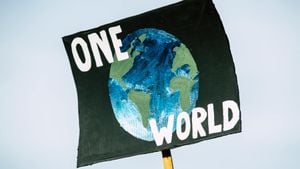The upcoming COP29 climate summit, set to take place from November 11 to 22, 2024, is expected to be more than just another gathering of nations discussing the environmental crises affecting the planet. This year, the summit will be hosted by Baku, Azerbaijan, with heightened scrutiny on its ability to deliver efficient negotiations amid significant challenges. Azerbaijan's status as both host and as one of the world’s notable fossil fuel producers raises questions about the credibility and focus of the discussions to take place.
Interestingly, COP29 is projected to see reduced participation compared to last year’s COP28 in Dubai, with estimates of fewer than 50,000 attendees compared to the previous 100,000. This decline can be attributed to Baku’s limited infrastructure to accommodate large events, alongside its selection as host coming quite late. Simultaneously, the special presence of the private sector is markedly less. This scaled-back event might lead to more substantive and pointed discussions on climate action.
Azerbaijan’s heavy dependence on oil and gas raises eyebrows among climate activists, prompting doubts about the genuineness of its commitment to the climate agenda. Reports indicate the country is not only aiming to maintain its status as a fossil fuel producer but is planning to increase gas production substantially—from 37 billion cubic meters (bcm) to 49 bcm by 2033, according to data from Rystad Energy. This dilemma places Azerbaijan at the heart of criticism, making it challenging to reconcile its fossil fuel ambitions with the overarching goals of global climate negotiations.
Human rights organizations have also voiced concerns over hosting the summit in Azerbaijan due to its troubling track record on human rights issues, which includes arrests of journalists and suppressing dissent. This has led to calls from various non-governmental organizations (NGOs) advocating for the United Nations Framework Convention on Climate Change (UNFCCC) to adopt stricter human rights standards for host countries.
On the positive side, COP29 has garnered attention for its increased representation for Global South nations. The UN has enhanced allocation of badges to NGOs from regions most affected by climate change. This aims to amplify voices from the Global South, historically underrepresented at such high-stakes events, allowing for broader discussions around the impacts of climate change.
Key topics on this year’s agenda will include refining Nationally Determined Contributions (NDCs) under the Paris Agreement, securing new climate financing, and bolstering resilience for climate-vulnerable nations. Notably, climate financing is expected to be even more pronounced this year, echoing discussions from previous summits. Developing countries, particularly Small Island Developing States, are pressing for increased resources to adapt to the harsh realities posed by climate change.
Among the pressing issues will be the topic of loss and damage funding, introduced formally at the previous COP27. Nations vulnerable to the adversities of climate change are expected to demand concrete pathways and guarantees for funding deemed necessary for adaptation efforts. Countries like Nigeria, grappling with extreme weather events and disrupted agricultural patterns, are poised to advocate for receiving these funds to help bolster their climate resilience.
Another focal point will be energy transitions, particularly significant for Azerbaijan, as it seeks to present itself as both renewable-friendly and fossil-fuel dependent. Discussions around green energy innovations, economic diversification, and strategies to move away from oil reliance will dominate conversations. Experts stress the importance of Azerbaijan’s unique position as it navigates these discussions, potentially modeling how fossil-fuel economies can adapt to global standards advocating for sustainability.
The timing of COP29 is pivotal, occurring right before the February 2025 deadline for enhancing NDCs, which requires countries to present improved emissions reduction plans. Alarmingly, current global commitments, according to Climate Action Tracker, indicate the planet is on track for temperature rises between 2.6 to 3.1 degrees Celsius by the year 2100, far exceeding the Paris Agreement's goal of limiting warming to 1.5 degrees Celsius. Experts from the Intergovernmental Panel on Climate Change (IPCC) have warned of dire consequences if COP29 fails to produce strong, impactful commitments.
The choice of Baku as the host city is another intriguing aspect, as it sits on the southern shore of the Caspian Sea, making it the lowest capital city globally, sitting 28 meters below sea level. While this geographical peculiarity adds to the event's backdrop, it is also emblematic of the climate risks the region faces.
Despite the challenges, Azerbaijan has initiated efforts to shift narratives surrounding oil-dependent countries by declaring 2024 as the ‘Green World Solidarity Year.’ This initiative aims to reiterate its commitment to reducing emissions by 35 percent by 2030 and establishing a ‘Net-Zero Emission Zone’ within the Karabakh region. Toni Emesek, Senior Fellow at the Council on Foreign Relations (CFR), remarked on how Azerbaijan's hosting of COP29 could evolve the dialogue toward addressing the challenges oil-producing economies face during climate transition.
With the alterations to the typical COP format—fewer participants and amplified hosting responsibilities—COP29 has the potential to cultivate more concentrated discussions. The streamlined structure might steer conversations toward achieving tangible solutions, balancing the competing needs of high-emission nations and those representing vulnerable communities.
Meanwhile, Nigeria approaches COP29 with high stakes. The country has committed to achieving net-zero emissions by 2060, establishing its Long-Term Low Emissions Development Strategy and carbon market program. Nigeria aims to champion several key agendas at the summit, including the loss and damage fund which provides support for countries grappling with climate change repercussions.
Compounding matters, Nigeria has been severely affected by extreme weather patterns, such as massive flooding and shifting rainfall patterns, directly impacting its food security. This year’s COP session must be more than just symbolic for Nigeria's representative; actions must translate to commitments and funding to mitigate climate impacts on residents.
An intrinsic goal of Nigeria's delegation is to secure access to more adaptation funding, partnering and attracting investors for its carbon market, and enhancing its status as a leader within the gas market as the world transitions toward cleaner energy resources. The notion of gas as part of the transition is particularly important, considering Nigeria’s abundant natural gas resources, estimated at 202 trillion cubic feet, ranking it among the top reserves globally.
Adaptation discussions are also slated to take center stage at the summit with the recent increase of the Adaptation Fund by $188 million during COP28. Negotiations have already established Nigeria's eligibility for support from these adaptation resources; it remains pivotal for the nation to leverage opportunities and obtain much-needed assistance following its struggles with climate veracity.
Another noteworthy aspect of Nigeria’s participation last year was the identification of substantial representation from its sub-national entities. These entities proved to play significant roles at COP28, showcasing their potential to catalyze change through partnerships, collaborations, and joint ventures focused on energy transition efforts.
Collectively, Nigeria and other participants will need to advocate for substantial outcomes at Baku. Observational trends unequivocally indicate climate change is existential, with ramifications felt globally. Given its historical carbon emissions are relatively low, Africa, and Nigeria by extension, aims to leverage COP29 as another platform to unify voices for stronger adaptation efforts and effective climate action.



